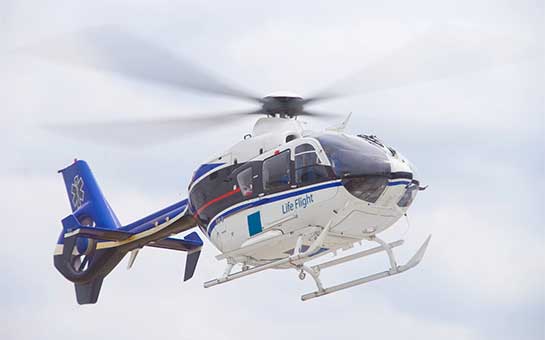A Traveler’s Guide to Medical Evacuation
Many travel insurance plans include a benefit called emergency medical evacuation coverage, yet most travelers are unaware of its critical importance until it's too late. A medical emergency far from home can be terrifying, and if local facilities can't provide the necessary care, getting you to a suitable hospital becomes the top priority.
This is where medevac insurance becomes your lifeline. Let's break down what this essential coverage is, what it includes, and why you should never leave home without it.
What is Emergency Medical Evacuation Coverage?
Emergency medical evacuation, often shortened to "medevac," is the transportation of a patient from one medical facility to another that is better equipped to handle their serious illness or injury. This is not a matter of choice; an evacuation only occurs when a physician certifies that the current facility cannot provide adequate medical treatment.
It's crucial to understand that travel insurance medical evacuation coverage is primarily for transportation costs. The medical bills themselves are covered by your travel medical insurance benefit. However, without medevac coverage, the cost of an air ambulance alone could be financially devastating.
The Need for Medical Evacuation Insurance
Whether you are exploring remote parts of the world or even visiting the United States, the quality of medical care can vary drastically. You might be in a country where the technology or expertise to treat your condition is unavailable, or the overall quality of care is substandard.
Even within the U.S., imagine suffering a serious injury while hiking in a national park or having a heart attack on a cruise ship in the Caribbean. A standard ambulance might not be able to reach you quickly or transport you to a hospital with the right specialists. These scenarios highlight why travel insurance medevac coverage is a necessity.
The cost of going without coverage can be staggering, with emergency evacuations ranging from $20,000 to over $250,000. Most people simply cannot afford this out-of-pocket. Furthermore, arranging a medical evacuation is a complex logistical process involving flight clearances, medical escorts, and hospital admissions, which is nearly impossible for an individual to manage during a crisis.
What Does Medevac Insurance Typically Cover?
When your insurance provider coordinates a medically necessary evacuation, the coverage is comprehensive. Although each plan is different and has detailed descriptions in its policy documents, here’s what’s generally included:
- Transportation: This covers the cost of getting you to the nearest appropriate medical facility. Depending on the location and urgency, this can be via:
- Air Ambulance (fixed-wing aircraft or helicopter)
- Ground Ambulance
- In some remote locations, it could even involve unconventional transport like a jeep.
- Medical Escort & Equipment: The air ambulance is typically staffed with a physician, nurse, and EMTs. It may be equipped with oxygen, medication, and other life-support materials to manage your condition during transit.
- Logistical Coordination: The insurance company's 24/7 emergency assistance team handles all arrangements, including ground transportation, identifying the right air transport, immigration clearances, and coordinating your admission into the new hospital.
- Repatriation to Home Country: Once your condition is stable enough for long-distance travel, many plans cover repatriation, which is the cost of bringing you back to your home country to recover.
- Companion Travel: There is often room for one companion to travel with you in the air ambulance.
- Repatriation of Remains: In the unfortunate event of death, this benefit covers the costs associated with transporting the deceased's remains back home.
How to Use Your Medical Evacuation Coverage
To use your travel insurance medevac coverage, there is one rule you must follow:
All arrangements MUST be made by your insurance company.
In a medical emergency, you or a companion must contact your insurance provider's 24/7 assistance hotline. They will verify your condition with the attending physician and handle the logistics. You typically cannot make your own arrangements and submit a claim for reimbursement later.
It is also important to note that medical evacuation is for emergencies. You cannot demand to be evacuated simply because you would prefer to be treated in your home country. The evacuation must be deemed medically necessary.
Standalone Medical Evacuation Plans
While medevac coverage is a core component of most comprehensive travel insurance plans , you can also purchase standalone medical evacuation and repatriation plans. These are particularly useful for individuals who may have other medical coverage but need to supplement it with a robust evacuation plan, such as those meeting the J visa insurance requirements set by the US State Department.
Travel Insurance Medevac FAQs
What is the difference between medical evacuation and initial rescue?
Medical evacuation is transport from one medical facility to another. It does not typically cover the initial rescue from the point of injury (e.g., being airlifted from a mountain after a fall). For that, you may need specialized search and rescue or adventure sports coverage.
Is medevac the same as repatriation?
No. Medical evacuation gets you to the nearest facility that can treat you. Medical repatriation gets you back to your home country for continued care, usually after you are stabilized. Both are often included in the same benefit.
Does my regular health insurance cover medical evacuation?
It is highly unlikely. Most domestic health insurance plans, including Medicare, offer very limited or no coverage for medical services and transportation outside of your home country or network area.
Can I choose which hospital I am evacuated to?
Generally, no. The insurance company and their medical team will transport you to the nearest medical facility that they deem capable of providing the appropriate level of care for your condition.
Get instant quotes for this plan and purchase today!
Can't find answers to your questions?
Ask our specialists - Licensed and experienced insurance professionals in the U.S.
